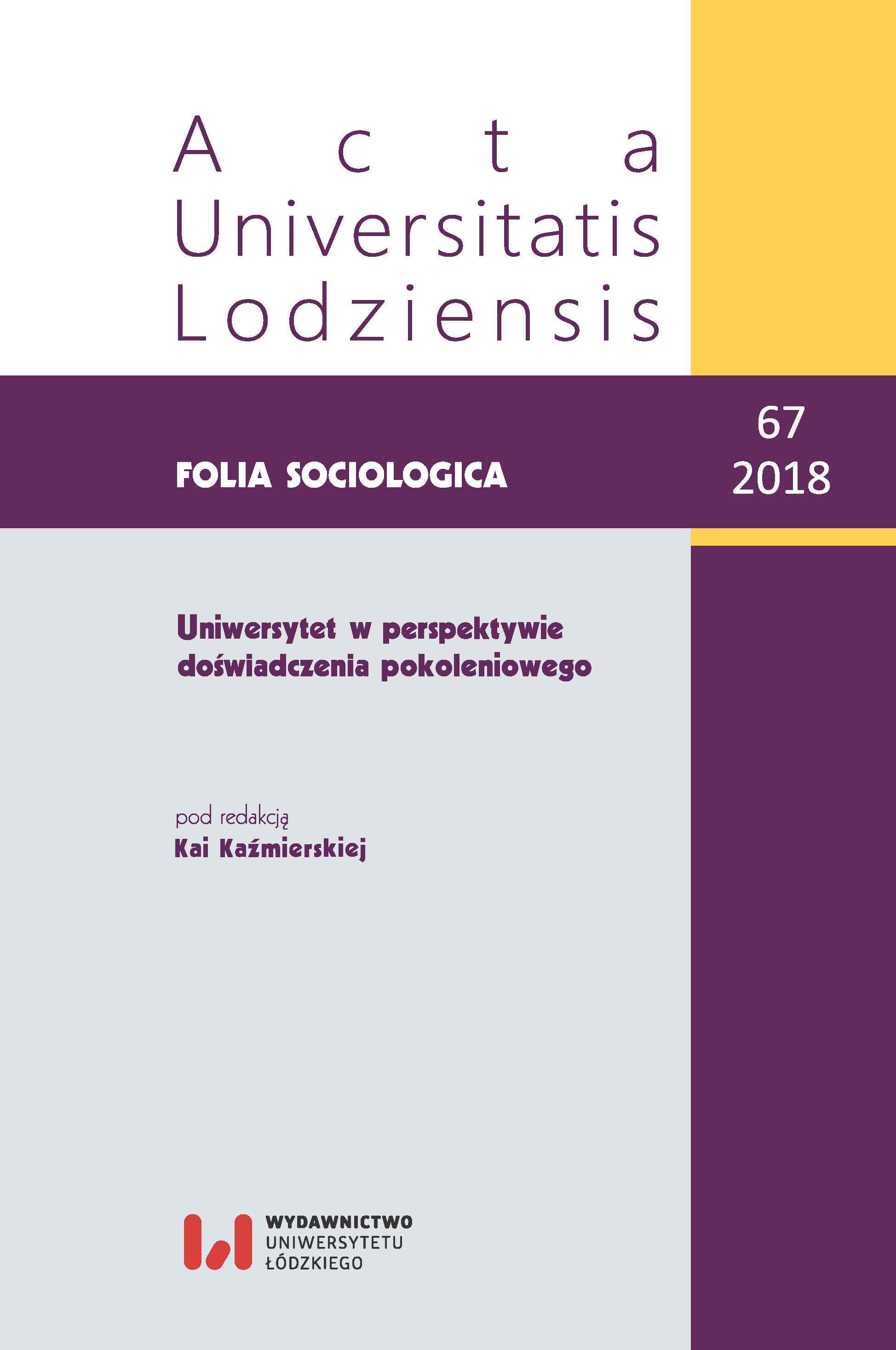Searching for a biographical meaning after the fall of the german democratic republic. The case of Helga Kuske
DOI:
https://doi.org/10.18778/0208-600X.67.07Keywords:
biographical analysis, construction of identity, symbolic universe, biographical experience of the GDRAbstract
The article focuses on the analysis of the autobiographical narrative interview with Helga Kuske. Narrator, born in the post-war decade, in East Germany, experiences biographically the symbolic universe of the German Democratic Republic as well as the trajectory associated with the biographical difficulties of coping during the systemic transformation. Case study of Ms Kuske life story oscillates between an attempt to capture her biography in the context of the post-war history of East Germany and a study of her life history with reference to the concept of the symbolic universe of Berger and Luckmann. The text also aims to show the relationship between individual biographical experience and collective processes on the example of the impact of GDR mechanisms on the process of the controlling the life course of the GDR population.
References
Berger P., Luckmann T. (1983), Społeczne tworzenie rzeczywistości, Państwowy Instytut Wydawniczy, Warszawa.
Google Scholar
Brie M. (2004), Classifying GDR, [w:] Policy Paper, s. 1–4, https://www.rosalux.de/publication/27333/classifying-the-gdr.html [dostęp 15.08.2018].
Google Scholar
Diner D. (1996), On the ideology of Antifascism, “New German Critique”, nr 67, Legacies of Antifascism, s. 123–132.
Google Scholar
Esbenshade R. (1995), Remembering to Forget: Memory, History, National Identity in Postwar East-Central Europe, “Representations”, nr 49, Special Issue: Identifying Histories: Eastern Europe Before and After 1989, s. 72–96, https://www.jstor.org/stable/2928750 [dostęp 13.09.2018].
Google Scholar
Golczyńska-Grondas A., Grondas M. (2013), Biographical Research and Treatment. Some Remarks on Therapeutic Aspects of Sociological Biographical Interviews, „Przegląd Socjologii Jakościowej”, nr 4(9), s. 122–139, http://www.qualitativesociologyreview.org/PL/Volume24/PSJ_9_4_GolczynskaGrondas_Grondas.pdf
Google Scholar
Hirszowicz M., Neyman E. (2001), Społeczne ramy niepamięci, „Kultura i Społeczeństwo”, nr 3/4, s. 23–48.
Google Scholar
Kaźmierska K. (2008), Biografia i pamięć. Na przykładzie pokoleniowego doświadczenia ocalonych z zagłady, Wydawnictwo Nomos, Kraków.
Google Scholar
Kaźmierska K. (2016), Dramatyzacja obrazu doświadczeń czasu wojny w opowiadaniu biograficznym. Analiza przypadku, [w:] R. Dopierała, K. Waniek (red.), Biografia i wojna. Metoda biograficzna w badaniu procesów społecznych, Wydawnictwo Uniwersytetu Łódzkiego, Łódź, s. 301–339.
Google Scholar
Kaźmierska K., Schütze F. (2013), Wykorzystanie autobiograficznego wywiadu narracyjnego w badaniach nad konstruowaniem obrazu przeszłości w biografii. Na przykładzie socjologicznego porównania narracji na temat życia w PRL-u i NRD, „Przegląd Socjologii Jakościowej”, t. 9, nr 4, s. 122–139, http://www.qualitativesociologyreview.org/PL/Volume24/PSJ_9_4_Kazmierska_Schutze.pdf [dostęp 15.08.2018].
Google Scholar
Nagel U., Terpen Ch., Velez A. (2012), Potęga stosunków społecznych i siła podmiotu. Studium wschodnioniemieckich managerów przed i po 1989 roku oraz wyjaśnienie stabilności i niestabilności NRD na podstawie teorii biografii, [w:] K. Kaźmierska (red.), Metoda biograficzna w socjologii, Wydawnictwo Nomos, Kraków, s. 761–799.
Google Scholar
Riemann G., Schütze F. (1991), “Trajectory” as a basic theoretical concept for analyzing suffering and disorderly social processes, [w:] D. Maines (ed.), Social organization and social process. Essays in honor of Anselm Strauss, Aldine De Gruyter, New York, s. 333–358, online: [dostęp 15.08.2018].
Google Scholar
Rokuszewska-Pawełek A. (2016), Doświadczenia wojenne Polaków – analiza trajektorii wrześniowej, [w:] R. Dopierała, K. Waniek (red.), Biografia i wojna. Metoda biograficzna w badaniu procesów społecznych, Wydawnictwo Uniwersytetu Łódzkiego, Łódź, s. 101–129.
Google Scholar
Saryusz-Wolska M. (red.) (2009), Pamięć zbiorowa i kulturowa. Współczesna perspektywa niemiecka, Wydawnictwo Universitas, Kraków.
Google Scholar
Schmidt M.G. (2004), Social Policy in the German Democratic Republic, Wiesbaden [dostęp 15.08.2018].
Google Scholar
Schütze F. (2012), Analiza biograficzna ugruntowana empirycznie w autobiograficznym wywiadzie narracyjnym. Jak analizować autobiograficzne wywiady narracyjne, [w:] K. Kaźmierska (red.), Metoda biograficzna w socjologii, Wydawnictwo Nomos, Kraków, s. 142–278.
Google Scholar
Schütze F. (2012), Trajektorie cierpienia jako przedmiot badań socjologii interpretatywnej, [w:] K. Kaźmierska (red.), Metoda biograficzna w socjologii, Wydawnictwo Nomos, Kraków, s. 415–458.
Google Scholar
Schütze F. (2014), Autobiographical Accounts of War Experiences. An Outline for the Analysis of Topically Focused Autobiographical Texts – Using the Example of the “Robert Rasmus” Account in Studs Terkel’s Book, “The Good War”, “Qualitative Sociology Review”, nr 10(1), s. 224–283, http://www.qualitativesociologyreview.org/ENG/Volume28/QSR_10_1_Schutze.pdf [dostęp 15.08.2018].
Google Scholar
Strauss A. (1969), Mirrors and Masks. The Search for Identity, Published by Sociology Press, London.
Google Scholar
Wolff-Powęska A. (2011), The German Democratic Republic’s attitude towards Nazi Past, “Przegląd Zachodni”, nr 1, s. 73–102.
Google Scholar
Downloads
Published
How to Cite
Issue
Section
License

This work is licensed under a Creative Commons Attribution-NonCommercial-NoDerivatives 4.0 International License.










